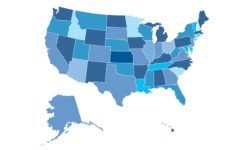Proposed Bill Would Impede Investigations and Clery/Title IX Compliance
College police chief explains how AB 1433 could make the justice system for California campus victims more cumbersome and less compliant with federal laws.

California college and university police personnel are actively discussing the potential impact of AB 1433, which was introduced by Assemblyman Mike Gatto Jan. 6. If passed, the bill would require that any report of a Part 1 violent crime (wilful homicide, forcible rape, robbery or aggravated assault) or hate crime received by a college or university be immediately reported to local police unless the victim requests anonymity.
According to Foothill-DeAnza Community College DistrictPolice Chief Ron Levine, the bill would have a significant impact on the Universities of California (UC), California State Universities (CSU) and 37 community college districts that maintain their own police departments. It would also slow down investigations and hamper Clery and Title IX compliance efforts.
“In the case of a CSU or UC, they handle all of their own crimes, no matter what the crime is,” Levine tells Campus Safety magazine. “If they require outside assistance, they ask outside local law enforcement to assist them with their investigation, whether it’s a homicide, rape or something else. Community college law enforcement agencies don’t have the same resources as CSUs and UCs, so many of them have an agreement with their local law enforcement agencies to handle Part 1 crimes, such as rapes. What this bill really affects are other Part 1 crimes we handle: something like an auto theft or Part 1 larceny or burglary. This bill really prevents a campus law enforcement agency from fulfilling its obligations because we would be required to turn over all of the cases to outside law enforcement that has no understanding of the inner-workings of a campus. They don’t know the players, the administrators and faculty, and they don’t have access to student records.”
Levine says that most local law enforcement agencies and officers don’t understand the Family Educational Rights and Privacy Act (FERPA) and how to properly interpret and apply it.
“These are areas where [campus police] have a very clear understanding of what information we can get, how we can get it and how we can use it lawfully,” he says. “Outside law enforcement doesn’t. They’ll say, ‘Give me every class roster.’ I can’t do that. If you want it, you need to come back with a subpoena or search warrant. It’s going to take them much longer to navigate the college campus system than it will for a law enforcement officer who already works on campus.”
Another challenge most municipal and county police would encounter is the current backlog of rape cases, which would prevent them from promptly investigating a sexual assault on campus. Levine claims that if AB 1433 becomes law, campus sexual assault cases would be required to get in line with all of the other cases. This would be a particular challenge when date rape is alleged because these cases are more intricate and consume more resources than cases involving rape committed by a stranger. AB 1433, however, does not provide additional resources to local law enforcement so they can handle the bigger case load.
“This is more work for them with no additional funding,” claims Levine. “So, we’ll be adding more work to already overworked county and municipal law enforcement. [Currently,] UCs and CSUs can devote a lot more attention to [sexual assault cases] because they don’t have the amount of backlog on high-priority cases that municipal and county law enforcement agencies have.”
Other areas of significant concern are Clery and Title IX compliance, which
If you appreciated this article and want to receive more valuable industry content like this, click here to sign up for our FREE digital newsletters!
 Leading in Turbulent Times: Effective Campus Public Safety Leadership for the 21st Century
Leading in Turbulent Times: Effective Campus Public Safety Leadership for the 21st Century
This new webcast will discuss how campus public safety leaders can effectively incorporate Clery Act, Title IX, customer service, “helicopter” parents, emergency notification, town-gown relationships, brand management, Greek Life, student recruitment, faculty, and more into their roles and develop the necessary skills to successfully lead their departments. Register today to attend this free webcast!








